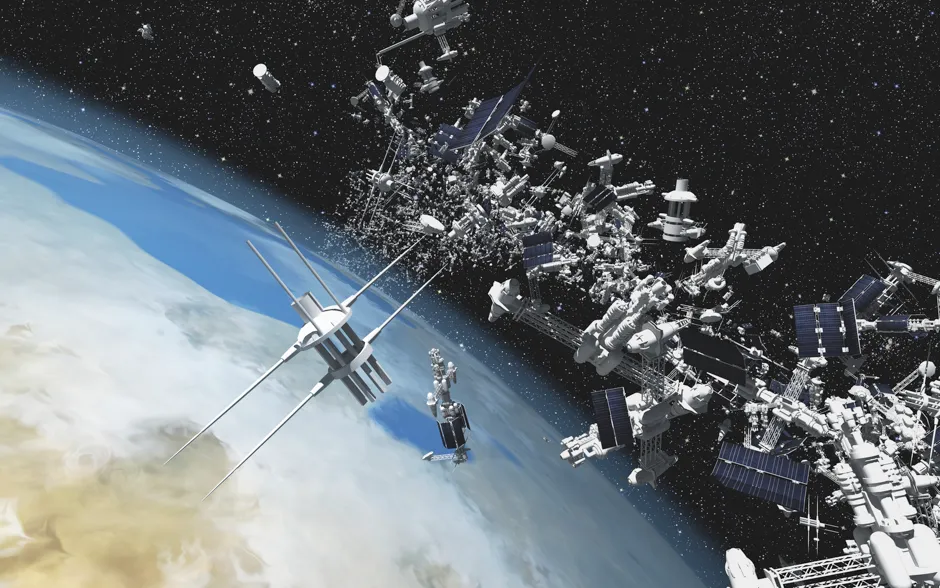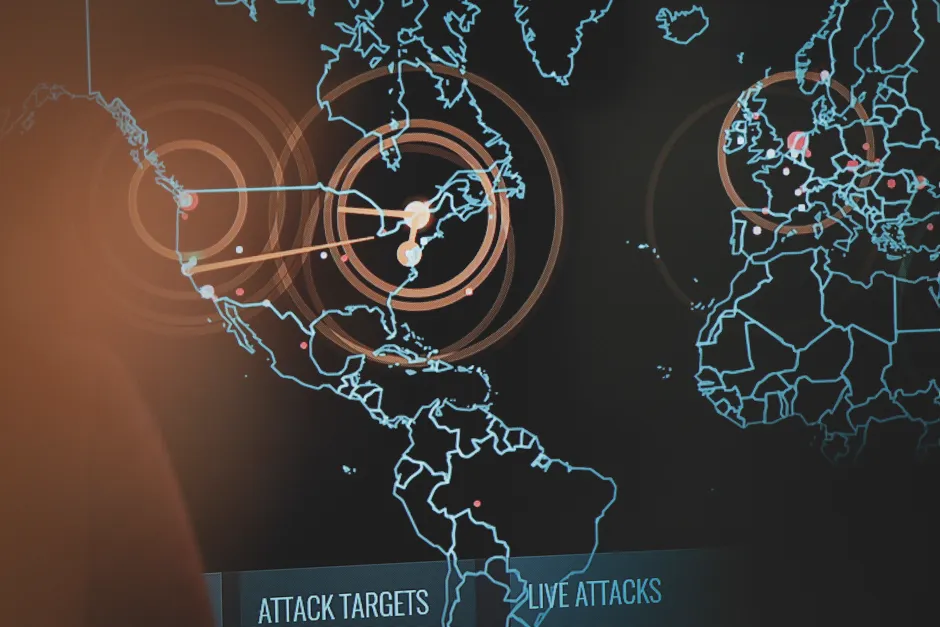While addressing members of the US military at the White House recently, Donald Trump spoke of his desire to create asixth branch of the United States Armed Forces– one dedicated to conflicts in space. “I was saying it the other day, because we’re doing a tremendous amount of work in space – maybe we need a new force, we’ll call it the Space Force,” he said.
The comments may have drawn scepticism from some quarters, but many experts believe space war is indeed coming. According to the narrative, whatever conflicts start on Earth are going to quickly move into space. From there it’s easy to conjure up images of laser guns, exploding satellites and rockets arcing around Earth to take out orbiting targets. Better up there than down here, you may think. But dig deeper and the reality is very different and ultimately much more frightening. In fact, according to how you define space war, there’s an argument that says it’s already taking place.
“Unless you’re very narrowly defining space warfare as blowing up satellites and shooting lasers, there are elements of space warfare that date back to the Gulf War in 1991,” says Prof Joan Johnson-Freese, at the US Naval War College, Rhode Island.
Read more:
During that war, the GPS satellite navigation system allowed the American-led coalition to make a fast, accurate run across the Kuwaiti desert to outflank the invading Iraqi forces and ensure victory. Fast-forward to today and although the superpowers aren’t in open conflict with one another, they’re already testing each other’s space capabilities. In 2014, Chinese hackers broke into the US’s National Oceanic and Atmospheric Administration (NOAA) weather and satellite systems. Russian cyber warriors have also hacked satellite transmissions. And it’s a sure bet the US has done the same back.
The reason is that a superpower’s modern military relies on space as never before. Communication, navigation and surveillance are the foundations that allow a military force to achieve its objective. Therefore the first thing combatants are going to do in any future conflict is try to remove these capabilities. But the space war cliché of actually blowing up the satellites will be a last resort for one simple reason: the amount of space debris it would create.
When a satellite fragments it generates tens of thousands of pieces of space debris. These circle the Earth at speeds of more than 7km per second. At these speeds, even a coin-sized piece of shrapnel will deliver the energy equivalent of an exploding hand grenade if it hits another satellite. This will instantly destroy it, creating tens of thousands more pieces of debris and making more satellite collisions inevitable. The kicker is that space debris is uncontrollable and so satellites will be destroyed indiscriminately, meaning that yours will be taken down as well as those of your enemies. In the nightmare scenario known as theKessler syndrome, we lose access to space entirely because there’s so much junk up there that anything launched is instantly sandblasted into moredebris. Losing space in this way would have major consequences not just for the military but for all of us.

Every single day we rely on satellites to make our lives easier. From weather reports to knowing when the bus is coming, talking to friends on mobile devices to watching videos online, everything uses data that’s either generated by satellites or routed through them. If we lose the satellites, we lose our way of life. Hence the superpowers have been looking at other ways of disabling satellites but keeping them intact. And this is where the lasers come in.
On 1 March, Russian President Vladimir Putin delivered his annual address to the Federal Assembly in Moscow. About 105 minutes into the presentation he said that Russia had begun equipping its military with laser weapon systems. He stated that he would not go into details but showed a video of an articulated truck with what looked like a large telescope attached to it. Such a system looks exactly like an anti-satellite laser weapon designed to dazzle spy satellites so they can’t take images, according to Stuart Eves, a mission concepts engineer and industrial chair of the Space Information Exchange, the forum for the UK government to discuss emerging threats with industry. “There have been reports from the US that some of its surveillance satellites have been ‘lased’ from facilities on the ground,” he says.
Repair our satellites, disable our enemies’
So far, the satellites have only been blinded temporarily. But if the laser were trained on the satellite for long enough it could blind it permanently. And this is just the beginning. From space, other non-destructive military applications become feasible. Imagine a small satellite that flies close to an enemy’s military communications satellite. It could sit alongside and listen to everything that’s being transmitted. Or it could emit its own signal and jam the satellite’s communications at a vital moment. And of course, there are those who are thinking of more direct approaches.
In the coming few years, we’re going to see a slew of small satellites launched on servicing missions. These newly developed satellites will have the ability to rendezvous, inspect, even grab hold of other satellites and manoeuvre them. They’re designed to extend the life of ageing communications satellites whose fuel is running low but whose payloads are still functioning. In effect, the small satellite will become a ‘jetpack’ saving the satellite’s owners from the expense of having to replace it and lowering the cost of communications for us all. In more advanced versions, the service satellite will be able to reach in, cut into a fuel line and replenish the satellite’s tanks. Sounds great, but spare a thought for the dark version of this scenario. What if the service satellite isn’t owned by you? What if it approaches and pushes your satellite out of orbit or cuts a fuel line and leaves it bleeding into space? According to Doug Liddle, CEO of In-Space Missions Ltd, “Every mission that goes up to service a satellite could be used by an unscrupulous nation to damage it instead.”
This grey area extends beyond servicing missions. In the same way that a knife can be used to eat a meal or to murder someone, “nearly everything in space is a dual-use technology,” says Liddle.

So if we can’t ban space weapons then the next best step is to restrict their use through international law. Warfare isn’t necessarily a lawless free-for-all. Rules of engagement are internationally recognised guidelines about what can legally be undertaken by a military force. They’re key to keeping military coalitions together.
An international consortium of law, military and space experts at the University of Adelaide Law School is putting together the Woomera Manual. According to the university’s website, it “will become the definitive document on military and security law as it applies to space.” The project will be completed by 2020 and then widely disseminated.
When it comes to space, these guidelines are needed more than ever because space is unlike any battleground that has ever previously been contested. Johnson-Freese believes that this changes the traditional rules of engagement. “In the army, in the infantry, you want to take the high ground because it gives you an advantage. Well, in space having the high ground with a satellite certainly gives you 24/7 coverage of areas you might not have been able to access but you’re also a sitting duck because satellites travel in predictable orbits and they’re the brightest objects against a dark sky, so they’re relatively easy to target.”
Apart from the space debris aspect, there’s another pressing reason to avoid space war. It’s a frightening reality that recent war gaming exercises have driven home. “Most of the results are highly classified,” says Johnson-Freese, “but they do release some unclassified summaries. We know from the results they let out, space war escalates very quickly. And they can escalate from space to nuclear. So there’s a definite interest in preventing that escalation.”
But with the various superpowers continuing to probe each other’s space capabilities, it’s not an easy task. “Something like the Cold War is actually happening in orbit at the moment,” says Eves. The job in hand is to stop it hotting up.
- This is an extract from issue 324 of BBC Focus magazine - Subscribe here